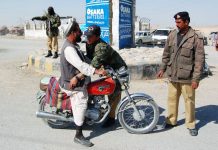Ghundi Abdalkhel, Khyber Agency: The village is only eight kilometers from Peshawar, the capital city of Khyber Pakhtunkhwa province. It has three marble factories that produce world-class marble tiles provided to the rest of the country. It has no clean drinking water though.
Juma Khan,20, who works in a nearby marble factory says he doesn’t mind that the people of Ghuni Abdalkhel have no clean water to drink. What he wants is a proper job that would help him earn enough money to feed his children.
“I work at least 10 hours in the factory and the owner pays me only Rs 300 per day”, says Juma Khan. “It is inhuman for factory laborers working long hours with blades and heavy marble stones in the factory. The authorities are not interested in developing the village despite the three large marble industries here. The government can try and improve the lot of the residents here, most of whom are factory workers, by asking the owners to increase the salaries and provide other facilities.”
The Constitution of Pakistan contains a number of provisions related to labor rights and the country’s labor laws spell out obligatory terms and conditions for employment of labor to protect their rights. However, both the Constitution and the labour laws do not apply to the Federally Administered Tribal Area (FATA) along the Pakistan- Afghanistan border where village Ghundi Abdalkhel is.
FATA has a special status under the Pakistani Constitution. It is ruled through a set of discriminatory laws – Frontier Crimes Regulations or FCR – dating back to the Raj when the British wanted to counter the opposition of the tribesmen to their rule.
FCR states that three basic rights – right to appeal to change a conviction in any court, the right to legal representation and the right to present evidence in the court – are not applicable to the people of FATA. A parallel administrative system, therefore, doesn’t allow FATA people access to the legal and rights framework that citizens in the rest of Pakistan enjoys.
The factory labor said benefits of the marble factories go to owners who have no interest in the welfare of the village or its people. They asked for schools for boys and girls in the village so education could give them a better future.
“I don’t want my children to turn into daily wage earners like me,” said Juma Khan. “I want my son to become a doctor and my daughter to be a teacher.”
Despite the three marble factories producing marble tiles of international quality, the villagers have no access to clean drinking water. Adjacent to the Regi Model Town, a posh under residential colony in Peshawar currently under construction, the villagers still use fire-wood to bake break.There is no health facility, schooling, water, sanitation and job opportunities in government departments for them to earn livelihood for their families, villagers said.
Ghundi’s reputation as a village producing quality marble tiles sits incongruously with its history as place torn apart by waves of militancy during the last decade. Most of the infrastructure in Ghundi has been damaged in militancy-related incidents. Those who could afford have left the village. Only the poor have stayed behind.
“We have no option but to live here, risking our lives,” says Juma Khan.
The villagers live in fear of being attacked by unidentified gunmen who have claimed at least two hundreds civilian lives in the decade-long militancy.
“It is not enough to conduct search and military operations to fight terrorism in his area,” says Juma Khan. “The authorities must address the people’s sense of deprivation and grievances.”
Mustaqeem Khan Afridi, a student, said the village comprises 1,400 families with almost 7,000 people in all. He says due to growing population and militancy, living in the village has been hard.
While it is difficult for a male reporter to speak to women, Wasim Jan, a resident of Ghundi said that the women fetched water from three kilometers away for domestic use.
He said: “Our women do a risky job going out in such a hostile environment.”
Wazir Gul,55, said Pakhtuns could not afford that other people see his wife out of the home but some time problems compel them to do so.
Muslim Afridi, 17, suggested that if the government resolved the problem of frequent and long power-cuts, they could perhaps grow seasonal crops like wheat and rice.
“To overcome problems stemming from militancy, we need attention from the government and humanitarian organizations,” said Afridi.
Saqib Ali Khan, a mobile software engineer, said the government should create jobs in education, health and technical education departments to employ youth of the areas exposed to militancy.
He said only marble factories are not enough to eliminate poverty from his village. “One should start several parallel projects to benefit local people,” he said.
Saleem Afridi, a retired soldier said he spent rupees 2.6 million on building a house but he was forced to leave the area due to violence and find a safer place elsewhere that he cannot reveal to media because he fought on the side of the government.
“I served the government for 24 years and now I request the government to help me,” said Afridi. “I devoted golden years of my life to my homeland.”



